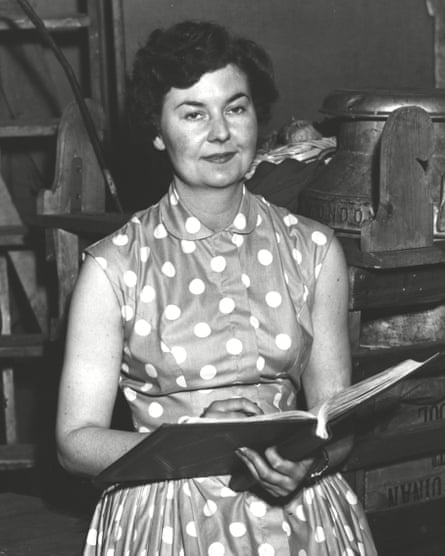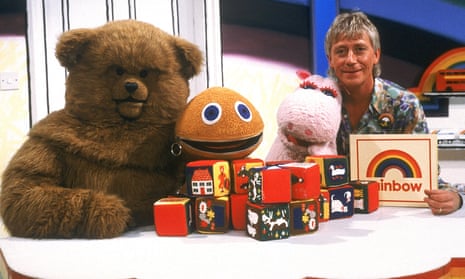Pamela Lonsdale, who has died aged 94, was a prolific producer of programmes for young viewers. Her greatest gift to television was Rainbow, the lunchtime show for preschool children that achieved cult status during its 20-year run.
Lonsdale’s initial idea included a puppet bear called Rainbow, invented by her husband, the actor turned producer Reginald Collin. It appeared only in a pilot show (not broadcast) but was transformed into the clumsy, brown, furry bear Bungle by the time the first episode was screened – joined by the hyperactive Zippy, with a zip for a mouth, and two glove puppets, Sunshine and Moony. For the second series, the glove puppets were dropped and the larger creatures were joined by George, a shy, pink hippopotamus.
The presenter – David Cook for the first series, Geoffrey Hayes for the rest – was a parent figure to the squabbling puppets. Featured alongside them, on a single theme for each episode, were tales from the Rainbow storybook, documentary films on topics such as going to hospital, and music performed originally by the folk group Telltale, then several trios, ultimately – and most famously – Rod, Jane and Freddy.
Rainbow began in 1972, after a government restriction on television broadcasting hours was lifted, opening up the afternoon schedules. For the first time, ITV investigated the possibilities of making shows for preschool children, after deciding against screening the American educational series Sesame Street on the basis of its unsuitability for the age group.
Lonsdale, who was producing children’s programmes at Thames Television, worked with Jill Kent, an education adviser, on a format that would help to develop language and social skills for those on the verge of going to primary school. Despite having a limited budget, Lonsdale insisted on the highest production standards. The opening credits and animated inserts were made by Brian Cosgrove and Mark Hall of Stop Frame Productions. When that business closed in 1975, Lonsdale was instrumental in setting up Cosgrove Hall Films as a subsidiary of Thames Television, the ITV company that produced Rainbow. This allowed Cosgrove and Hall to continue to work on the show while making celebrated animated series such as Danger Mouse and The Wind in the Willows.
As well as directing some episodes, Lonsdale produced the first nine series of Rainbow (1972-80), and in 1975 was presented with the Society of Film and Television Arts award for best children’s programme.
Hayes and the show’s puppet characters gained a devoted following that endured beyond Rainbow’s run of more than 1,000 episodes. This ended in 1992 when Thames Television lost its ITV franchise. Two attempts by other companies to revive the programme between 1994 and 1997 failed to attract the same ratings.
Pamela Lonsdale Tucker was born in Pinner, Middlesex, to Stella (nee Slee), a milliner, and Nathan Tucker, an insurance clerk, who both came from Liverpool. Following the death of her father when Pamela was 11, she and her mother moved to Wallasey, at that time in Cheshire, where she attended the town’s high school.
Serving with the Wrens (Women’s Royal Naval Service) during the second world war, Pamela was bitten by the acting bug after performing in its productions. On demob, she went into repertory theatre as an assistant stage manager. She did some acting – taking her middle name as her stage name – then moved to London to work mainly as a stage manager in West End theatres such as the Duke of York’s, where she met Collin in 1955. They married five years later.

She then moved into television, as a production assistant for the ITV company ABC. One of the Armchair Theatre plays she worked on – with the producer Sydney Newman and director Philip Saville, both pioneers in TV drama – was Three on a Gas Ring (1959), which was banned because of its then controversial content, the story of a single mother.
On becoming a director, Lonsdale made episodes of the arts series Tempo – produced by her husband – between 1963 and 1968, as well as many magazine programmes and The Sunday Break, a religious show for young people. She graduated to producer, first with schools programmes and then, for children’s TV, The Forgotten Door (1966) and a 10-part adaptation of The Lion, the Witch and the Wardrobe (1967), written by Trevor Preston.
After ABC merged with Rediffusion to form Thames Television, Lonsdale made The Queen Street Gang (1968) and worked with Preston again on The Incredible Adventures of Professor Branestawm (1969) and the first two series (1970-71) of Ace of Wands, helping to develop his idea for a fantasy series featuring Tarot, a sleuth magician.
Lonsdale’s career as a producer or executive producer of many fondly remembered children’s programmes at Thames continued with Shadows (1975-78), The Boy Merlin (1979), The Latchkey Children (1980), The Squad (1980), Stig of the Dump (1981), Educating Marmalade (1982), S.W.A.L.K. (1982), The All Electric Amusement Arcade (1983), Chocky (1984), Danger: Marmalade at Work (1984), Chocky’s Children (1985) and, for Central Independent Television, News at Twelve (1988).
Before retiring in 1991, Lonsdale made several pictures for the Children’s Film Unit. She was executive producer of its 1988 production Hard Road, which won the children’s award at the Lucas international festival of films for children and young people.
Collin died in 2011.

Comments (…)
Sign in or create your Guardian account to join the discussion